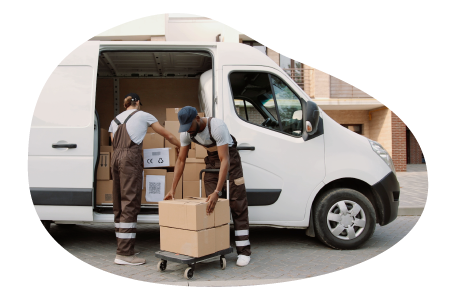
Bobtail insurance
Owning and operating a trucking business comes with certain risks, like collisions and liability claims. While commercial auto insurance covers these scenarios, it only applies to fully loaded trucks. You'll need bobtail insurance if you drive a semi-truck without a trailer.
What is bobtail insurance?
Bobtail liability insurance covers a truck driver’s liabilities if they get into an accident while driving a truck without a trailer between loads. It’s intended to cover the period between a payload drop-off and the next pick-up, when a commercial auto insurance policy wouldn't apply. Without it, you don’t have any liability protection if you get into an accident.
If the driver causes an accident, bobtail liability coverage will cover the other person’s injuries and property damages. Because bobtail insurance is a liability-only policy, it doesn’t provide any coverage for the truck driver’s injuries or truck damage.

What does bobtail insurance cover?
A bobtail insurance policy covers a driver’s financial responsibilities if they’re involved in or responsible for an accident while operating a trailer-less truck. It covers expenses like:
- Another motorist's vehicle repairs
- Damage to private property, like a fence or storefront
- Another driver’s medical expenses
- Legal fees and court costs
Bobtail insurance coverage only applies when a truck driver is under dispatch, and the truck is driven without a trailer attached. As long as the truck is bobtailing for business reasons, it’s covered.
For example, imagine a truck driver drops off a load in Baltimore and has to drive 40 miles to another pick-up in Washington D.C. If the driver gets into an accident while bobtailing during their drive to Washington D.C., bobtail insurance would cover it.
Bobtail auto liability also covers drivers who are bobtailing before or after a run. For instance, it would cover an accident that occurred while a trucker was driving from home to their first pick-up site or driving back home after dropping off the last load of the day.
Does bobtail insurance cover physical damage?
Bobtail insurance doesn’t cover third-party physical damage. It only covers a driver’s liabilities when they cause an accident that results in property damage or bodily injury.
Bobtail insurance won’t pay to repair the truck after a collision or another damage claim, like a hailstorm or flood. However, you can get physical damage insurance through your commercial auto insurance policy as an optional endorsement.
How much does bobtail insurance cost?

Your bobtail liability insurance rate will depend on a variety of factors, such as:
- Location
- Driver’s age and driving record
- Truck type and model
- Types of cargo hauled
- Number of trucks in the fleet
- Size of the operating area
You might be able to save money on bobtail insurance by bundling multiple trucking insurance policies into a fleet insurance package or paying your annual insurance premium in full.
Who needs bobtail insurance?
Bobtail insurance is often required for truck drivers who are under a lease agreement with a motor carrier or trucking company. If you own a transportation business and drive under your own authority, bobtail insurance is usually included with your primary liability policy.
Here are some of the people in the trucking industry who might need to purchase bobtail insurance:
- Trucking business owners
- Independent owner-operators
- Truckers that lease a trailer
- Truckers who drive a tractor for personal reasons
How to get bobtail insurance coverage
Bobtail insurance is often available as an endorsement on a commercial auto insurance policy. Most states have commercial auto insurance requirements for truck fleets.
To get bobtail insurance through Insureon, you can start a commercial car insurance quote online. Complete the application and select the option to add bobtail coverage to your policy. Your bobtail coverage will start on your policy’s effective date.
What is the difference between bobtail insurance and non-trucking liability (NTL) insurance?
Bobtail insurance and non-trucking liability insurance (NTL) are similar, but they cover different scenarios. And while the two are sometimes used interchangeably, they are separate policies.
Bobtail insurance covers trucks that are driving without trailers, but are still under dispatch. It commonly covers trucks that are en route to a pick-up location, or recently dropped off a load.
NTL covers trucks that are driven “off duty,” and are no longer under dispatch. For example, a non-trucking liability policy would cover a truck driver who stops at the grocery store between dropping off their last load and going home for the day and is involved in an accident in the store parking lot.
What is the difference between unladen liability and bobtail coverage?
Another term that’s often discussed with bobtail insurance is unladen liability, which refers to any scenario where the truck is driving, either under dispatch or off duty, without a cargo load. It applies to trucks that have a trailer attached or are bobtailing.
Commercial auto insurance doesn’t automatically cover unladen liability. You’ll need to add it as separate coverage to your insurance policy.
You might also come across the term deadheading, which is when a truck is driven with an attached, but empty trailer. If you’re driving a truck with an empty trailer, it’s covered under deadhead insurance, which is also separate from bobtail truck insurance.

Find commercial auto insurance quotes with Insureon
If you own or operate a trucking business, it’s easy to get bobtail insurance with Insureon. Fill out our easy online application to receive quotes from trusted insurance companies.
Our expert insurance agents are available to answer any questions about what types of coverage you need, policy limits, and more. They can also help you find other commercial truck insurance policies your business may need, like general liability insurance.
Most trucking businesses can get same-day coverage and easily download a certificate of insurance (COI) as proof of coverage right away.

Want free expert advice right in your inbox?
By entering your email address and subscribing, you agree to our Terms of Use and Privacy Policy















